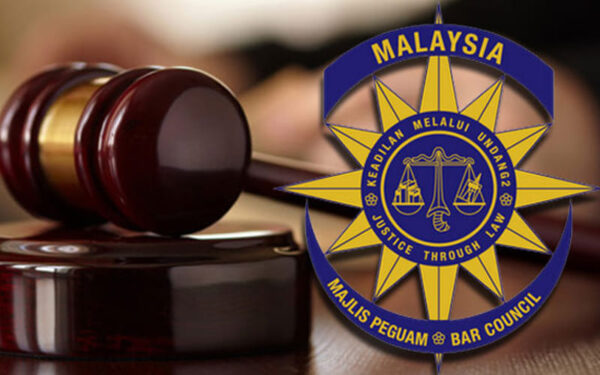
Should or shouldn’t MACC probe formal complaints of judges’ corrupt practices?
By Dr Kassim Nor Mohamed

I REFER to the Malaysian Bar Council’s media statement on April 3 and the joint statement by the Coalition for Clean and Fair Elections (BERSIH) as well as Gabungan Tindak Balas Malaysia (GBM) on April 11.
As an ardent observer of current issues relating to the enforcement sector, I wish to highlight several misconceptions and misinformation that have caused confusion and misunderstanding albeit from a layman’s perspective.
Although much has been argued in news and media pieces published by many authors recently, one of the issues raised is that the Malaysian Anti-Corruption Commission (MACC) has no right to initiate investigation into a superior court judge.
Does this line of argument have any basis with reference to the Federal Constitution which is the highest law of the country?
A number of constitutional experts have been quoted in the media recently rebutting this view.
One such expert is Associate Prof Datuk Wan Ahmad Fauzi Wan Husain who was quoted recently in Sinar Harian (April 10) stating that offences that touched on ethics and disciplinary issues cannot preclude the use of the Criminal Procedure Code, the MACC Act 2009, other existing laws and the powers of the Attorney-General (AG) as the public prosecutor under Section 145 of the Federal Constitution.

He argued that based on the principle of equality of the law, nobody should be exempted from being investigated. Judges who have been investigated or charged under existing laws must complete the process first before any proceedings under Article 125 that deals with ethics and disciplinary issues takes place which is an internal process.
Evidently, this argument is affirmed by the Federal Court judgment, chaired by Tun Tengku Maimun Tuan Mat, who reiterated the constitutional entitlement of enforcement bodies like the MACC to investigate Superior Court Judges.
Can judges be probed?
Here we can refer to the Federal Court judgment (Fb 24) on the civil suit brought by Haris Fathillah bin Mohamed Ibrahim & Anor vs. Tan Sri Azam Baki & Anor [Civil Reference No: 06(RS)-4-07/2022(W)] whereby the appellants declaratory reliefs are framed in the form of the following questions in the judgment:
Firstly, is whether with regard to Article 4 and Part IX, Federal Constitution, criminal investigation bodies – including but not limited to the MACC – are only legally permitted to investigate judges of the High Court, Court of Appeal and the Federal Court that have been suspended pursuant to Article 125(5) of the Federal Constitution?
Secondly, is whether the public prosecutor is empowered to institute or conduct any proceedings for an offence against serving judges of the High Court, Court of Appeal and the Federal Court pursuant to Article 145(3) of the Federal Constitution with regard to Article 4 and Part IX of the Federal Constitution.?

I REFER to the Malaysian Bar Council’s media statement on April 3 and the joint statement by the Coalition for Clean and Fair Elections (BERSIH) as well as Gabungan Tindak Balas Malaysia (GBM) on April 11.
As an ardent observer of current issues relating to the enforcement sector, I wish to highlight several misconceptions and misinformation that have caused confusion and misunderstanding albeit from a layman’s perspective.
Although much has been argued in news and media pieces published by many authors recently, one of the issues raised is that the Malaysian Anti-Corruption Commission (MACC) has no right to initiate investigation into a superior court judge.
Does this line of argument have any basis with reference to the Federal Constitution which is the highest law of the country?
A number of constitutional experts have been quoted in the media recently rebutting this view.
One such expert is Associate Prof Datuk Wan Ahmad Fauzi Wan Husain who was quoted recently in Sinar Harian (April 10) stating that offences that touched on ethics and disciplinary issues cannot preclude the use of the Criminal Procedure Code, the MACC Act 2009, other existing laws and the powers of the Attorney-General (AG) as the public prosecutor under Section 145 of the Federal Constitution.

He argued that based on the principle of equality of the law, nobody should be exempted from being investigated. Judges who have been investigated or charged under existing laws must complete the process first before any proceedings under Article 125 that deals with ethics and disciplinary issues takes place which is an internal process.
Evidently, this argument is affirmed by the Federal Court judgment, chaired by Tun Tengku Maimun Tuan Mat, who reiterated the constitutional entitlement of enforcement bodies like the MACC to investigate Superior Court Judges.
Can judges be probed?
Here we can refer to the Federal Court judgment (Fb 24) on the civil suit brought by Haris Fathillah bin Mohamed Ibrahim & Anor vs. Tan Sri Azam Baki & Anor [Civil Reference No: 06(RS)-4-07/2022(W)] whereby the appellants declaratory reliefs are framed in the form of the following questions in the judgment:
Firstly, is whether with regard to Article 4 and Part IX, Federal Constitution, criminal investigation bodies – including but not limited to the MACC – are only legally permitted to investigate judges of the High Court, Court of Appeal and the Federal Court that have been suspended pursuant to Article 125(5) of the Federal Constitution?
Secondly, is whether the public prosecutor is empowered to institute or conduct any proceedings for an offence against serving judges of the High Court, Court of Appeal and the Federal Court pursuant to Article 145(3) of the Federal Constitution with regard to Article 4 and Part IX of the Federal Constitution.?

Dr Kassim Noor Mohamed
Here, the Federal Court judgement had replied “No” to the first question and a “Yes” to the second question (page 22). Although the judgment also stated that a set of protocols should have been followed, ie informing the Chief Justice before commencing investigations, the seven-panel judges concluded and I quote:
“In conclusion, we reiterate that serving Superior Court Judges are not immune from criminal investigations or prosecution. They need not be suspended or removed before they can be investigated or prosecuted.…” (point 89, page 32)
This is because, they admitted that the “Chief Justice cannot summon eye-witnesses or conduct an independent inquiry without the police. In a corruption case, the Chief Justice cannot verify bank records and question transactions….” (Page 16).
Furthermore, if a “serving Superior Court Judge is accused of a crime such as murder, rape or even corruption, how is evidence to be gathered to separate the wheat from the chaff (spurious allegations from genuine complaints)?” (Page 17)
To probe or not if a complaint is filed
The above leads us to the second issue raised by the groups claiming that the MACC has neither the competency nor jurisdiction to investigate judge’s ethics.
Going by logic of the Federal Court judgment, if the MACC is not permitted to conduct investigations on complaints of corruption or misconduct on judges, how would the next presiding authority who admittedly does not have the competency to “summon eye-witnesses or conduct independent inquiry or verify bank records” is able to determine whether there is any basis to the allegations in order to proceed with the suspension of the judge under Article 125(5), of the Federal Constitution?
It may be true that the MACC has no prerogative in investigating breaches of judicial ethics. But if the MACC received formal complaints relating to allegations of corruption on a Superior Court judge, should it not investigate at all when the law prescribes for the commission to investigate any allegations corruption?
And how would anyone know if the allegations are baseless without the commission investigating the allegation?
Primarily, one should understand that the MACC report is merely its findings and it has no power to order or instruct proceedings against the accused. This is following the principle of separation of power.
Therefore, it is up to the Chief Justice whether to commence a tribunal or a Judges Ethics Committee proceeding to look into the matter or to consider the case closed. Hence, the MACC should not be faulted for conducting an investigation under its constitutional right.
Secondly, this is not the first time that the ethics of a Superior Court Judge has been questioned. One should remember the case in 1996 when a High Court judge had written an anonymous letter alleging, among others, the ethical misconduct of former Chief Justice Tun Eusoff Chin.
The judge was urged by none other than the Malaysian Bar to report to the then Anti-Corruption Agency (ACA) to investigate the matter. Strangely, the same Malaysian Bar is now so vehemently opposed to the more empowered MACC to investigate allegations into a High Court judge’s misconduct.
Here, the Federal Court judgement had replied “No” to the first question and a “Yes” to the second question (page 22). Although the judgment also stated that a set of protocols should have been followed, ie informing the Chief Justice before commencing investigations, the seven-panel judges concluded and I quote:
“In conclusion, we reiterate that serving Superior Court Judges are not immune from criminal investigations or prosecution. They need not be suspended or removed before they can be investigated or prosecuted.…” (point 89, page 32)
This is because, they admitted that the “Chief Justice cannot summon eye-witnesses or conduct an independent inquiry without the police. In a corruption case, the Chief Justice cannot verify bank records and question transactions….” (Page 16).
Furthermore, if a “serving Superior Court Judge is accused of a crime such as murder, rape or even corruption, how is evidence to be gathered to separate the wheat from the chaff (spurious allegations from genuine complaints)?” (Page 17)
To probe or not if a complaint is filed
The above leads us to the second issue raised by the groups claiming that the MACC has neither the competency nor jurisdiction to investigate judge’s ethics.
Going by logic of the Federal Court judgment, if the MACC is not permitted to conduct investigations on complaints of corruption or misconduct on judges, how would the next presiding authority who admittedly does not have the competency to “summon eye-witnesses or conduct independent inquiry or verify bank records” is able to determine whether there is any basis to the allegations in order to proceed with the suspension of the judge under Article 125(5), of the Federal Constitution?
It may be true that the MACC has no prerogative in investigating breaches of judicial ethics. But if the MACC received formal complaints relating to allegations of corruption on a Superior Court judge, should it not investigate at all when the law prescribes for the commission to investigate any allegations corruption?
And how would anyone know if the allegations are baseless without the commission investigating the allegation?
Primarily, one should understand that the MACC report is merely its findings and it has no power to order or instruct proceedings against the accused. This is following the principle of separation of power.
Therefore, it is up to the Chief Justice whether to commence a tribunal or a Judges Ethics Committee proceeding to look into the matter or to consider the case closed. Hence, the MACC should not be faulted for conducting an investigation under its constitutional right.
Secondly, this is not the first time that the ethics of a Superior Court Judge has been questioned. One should remember the case in 1996 when a High Court judge had written an anonymous letter alleging, among others, the ethical misconduct of former Chief Justice Tun Eusoff Chin.
The judge was urged by none other than the Malaysian Bar to report to the then Anti-Corruption Agency (ACA) to investigate the matter. Strangely, the same Malaysian Bar is now so vehemently opposed to the more empowered MACC to investigate allegations into a High Court judge’s misconduct.

Thirdly, and more baffling, there has been grave misinformation about the MACC announcing its investigation on the High Court judge, allegedly in bad faith. The first time the issue was confirmed was in a report on The Star dated April 22, 2022.
At that time, the media was rife with allegations of a High Court judge being probed by the MACC as a number of reports and memorandums by individuals and groups have already been issued urging the MACC to investigate the judge.
We must not lay fault on the MACC chief commissioner for confirming the investigation if the issue is already out in public and with the media hounding him for a confirmation. By merely confirming the probe to a single reporter is not tantamount to announcing to the world in bad faith.
With that confirmation, the Bar Council and the opposition then took the MACC to task for supposedly breaching the separation of powers for investigating the judiciary.
It was after the attacks on the MACC that it issued a media statement on April 28, 2022 defending its mandate to investigate “public officers” which include judges in the definition as stated in the MACC Act 2009.
Again, simply stating that it is following the procedure based on the law is by no means taken to mean that the announcement is designed to smear the good name of the judge.
Finally, investigating one judge does not amount to attacking the entire judiciary. Just because the judge happened to preside on a high-stake case that everyone wants to see the main culprit convicted, does not mean that any probe on that judge is tantamount to attempts to exonerate the culprit.
Perhaps the Bar Council and its allies have forgotten that it was the MACC who has put in years of thorough investigation on that very case that has successfully brought about a strong conviction.
We often hear, “Justice must not only be served, but must also be seen to be served”. More importantly, we must also add that “justice has to be based on facts, not emotions and perceptions”. – April 14, 2023
Dr Kassim Noor Mohamed is vice-chancellor (designate) at the Enforcement Leadership and Management University (ELMU).
***
kt comments:
I refer you again to the following paragraphs (taken from above):
Primarily, one should understand that the MACC report is merely its findings and it has no power to order or instruct proceedings against the accused. This is following the principle of separation of power.
Therefore, it is up to the Chief Justice whether to commence a tribunal or a Judges Ethics Committee proceeding to look into the matter or to consider the case closed.
Therefore, it is up to the Chief Justice whether to commence a tribunal or a Judges Ethics Committee proceeding to look into the matter or to consider the case closed.
So, now that the MACC findings on Nazlan has been submitted to the CJ, what is she going to do???
If we are not careful, Malaysia is heading towards the direction of Erdogan's Turkiye, where the Executive regularly arrests Judges who are considered "not aligned" on trumped up charges.
ReplyDelete